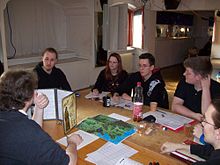Role-playing game - Simple English Wikipedia, the free encyclopedia
A role-playing game (also called an RPG) is a game in which one plays the role of one or several characters (people), either verbally (traditional RPGS), in a computer or video game, or alone (gamebooks). Often the characters gain experience (EXP) during the game, which makes them stronger.
Traditional RPGs
[change | change source]
A traditional role-playing game, or tabletop role-playing game, is a form of role-playing game (RPG) in which each person playing the game will make-believe that he or she is a character in the game. A person playing the game will tell the action of his or her character, and a system of rules will tell whether the action can be done or not. The game will happen in a made-up world that is controlled by another person playing the game, called a gamemaster (GM). The gamemaster tells the game's story to the players, tells them where they are in the game world, and plays the part of all the Non-Player Characters (NPCs) and monsters that the players meet.
The gamemaster will also give quests or tasks for the characters to complete. Characters usually have things about them that limit their actions, such as strength or speed, and as the character completes the quests, he or she is awarded experience points which can be used to make the character better.
Most tabletop RPGs use dice rolls when a player tries to do something hard in the game (Like attacking a monster, or jumping over a gap). This means that there is luck in the game, as well as skill. Most games have a system of bonuses so that they can succeed more often.
A short example:
GM: "You enter a small room. It is wet and smells bad. You hear water dripping from somewhere. You see a small, shaking pile of gray jelly in the middle of the room."
Player: "I touch the pile with the tip of my sword."
GM: "The jelly starts to move up your sword."
Player: "I drop my sword."
GM: "The jelly starts to eat your sword, but you are safe."
Good GMs balance challenges and rewards, giving the players the chance to recover from mistakes, but at the same time providing consequences for the player's actions. One example of this type of RPG is Dungeons & Dragons
Role-playing video games
[change | change source]Live action role-playing game (LARP)
[change | change source]In LARP, the people play their characters themselves, much like a play. They act out the things their character does, dress like their character, and often talk in the way their character would.


 French
French Deutsch
Deutsch